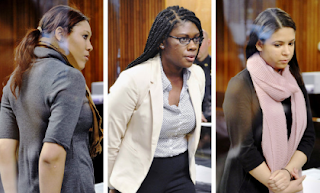Three black students at the University at Albany, New York alleged that they were attacked on a city bus by a group of white men who used racial slurs as other passengers and the driver sat silently by.
The allegation that occurred last 30 January set social media ablaze, sowing shock and outrage as it went. It would draw hundreds of people to a campus rally against racism; an emotional response from the university’s president; and even the attention of Hillary Clinton, who condemned the attack on Twitter. Unfortunately, the claim was reported to be false and the allegations were a hoax!
"We are shocked, upset, but we will remain unbroken," one of the young women who reported the assault, Asha Burwell, said at the rally, on 1 February. "We stand here with strength because we value our worth as black women and as human beings in general."
But only a few weeks later, what seemed to be the latest iteration of a now-familiar debate about race on campus — the protests, the anguished soul-searching, the calls for greater faculty diversity and administrative changes — has metastasized into a controversy of an even more scorching kind: the allegation, the authorities said, was a lie.
Surveillance videos did not support the accounts of the young women, Ms. Burwell, Alexis Briggs and Ariel Agudio. Neither did the statements of multiple fellow passengers. Rather than being victims of a hate crime, the authorities said, the women had been “the aggressors,” hitting a 19-year-old white woman on the bus.
All three pleaded not guilty last 29 February to misdemeanor assault charges; Ms. Burwell and Ms. Agudio, who publicized the episode through Twitter, also pleaded not guilty to charges of making a false report. The judge who oversaw the arraignment called the charges, if proved, "shameful."
It was a turnabout tailor-made to delight conservative media outlets and to ignite social-media recriminations. There were calls for the university’s president, Robert J. Jones, to apologize for his remarks, and for Ms. Clinton, who is seeking the Democratic nomination for president, to remove her post on Twitter.
The allegation that occurred last 30 January set social media ablaze, sowing shock and outrage as it went. It would draw hundreds of people to a campus rally against racism; an emotional response from the university’s president; and even the attention of Hillary Clinton, who condemned the attack on Twitter. Unfortunately, the claim was reported to be false and the allegations were a hoax!
"We are shocked, upset, but we will remain unbroken," one of the young women who reported the assault, Asha Burwell, said at the rally, on 1 February. "We stand here with strength because we value our worth as black women and as human beings in general."
But only a few weeks later, what seemed to be the latest iteration of a now-familiar debate about race on campus — the protests, the anguished soul-searching, the calls for greater faculty diversity and administrative changes — has metastasized into a controversy of an even more scorching kind: the allegation, the authorities said, was a lie.
Surveillance videos did not support the accounts of the young women, Ms. Burwell, Alexis Briggs and Ariel Agudio. Neither did the statements of multiple fellow passengers. Rather than being victims of a hate crime, the authorities said, the women had been “the aggressors,” hitting a 19-year-old white woman on the bus.
All three pleaded not guilty last 29 February to misdemeanor assault charges; Ms. Burwell and Ms. Agudio, who publicized the episode through Twitter, also pleaded not guilty to charges of making a false report. The judge who oversaw the arraignment called the charges, if proved, "shameful."
It was a turnabout tailor-made to delight conservative media outlets and to ignite social-media recriminations. There were calls for the university’s president, Robert J. Jones, to apologize for his remarks, and for Ms. Clinton, who is seeking the Democratic nomination for president, to remove her post on Twitter.

